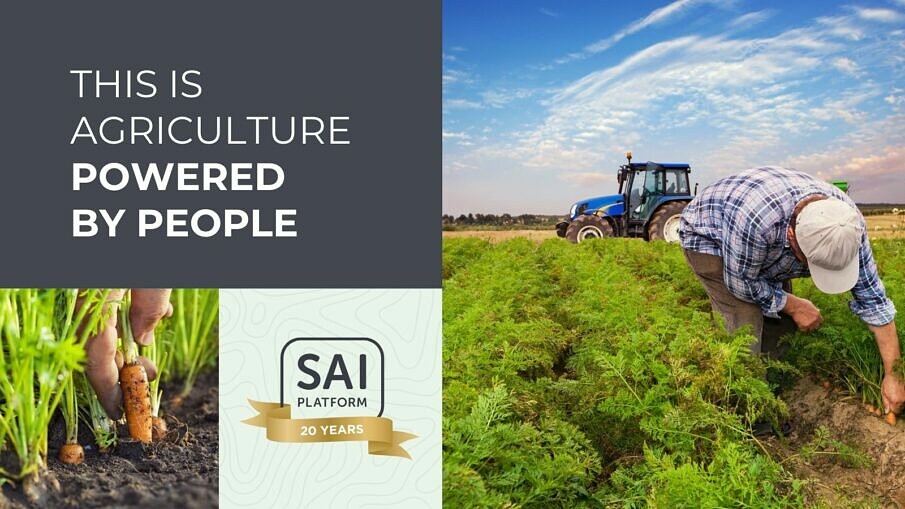Interview with Alan Johnson of the International Finance Corporation
19th April 2022
This year SAI Platform turns 20! And to help us celebrate this incredible milestone we’re talking to some of the members and partners who have helped us develop and champion sustainable agriculture over these last twenty years.

Overview
“The key issue is the linkages and the sharing of economic margins with farmers. In other words, certification schemes and price premiums for sustainable products at the consumer level have to create incentives for change at the farm level.”

The SAI Platform Advisory Council was formed in 2004, to provide critical and independent advice on progress and strategic direction. It consists of representatives from NGOs, farmer organisations, research institutes and other stakeholder groups. As part of the 20th anniversary celebrations, we spoke to Alan Johnson, of the International Finance Corporation (IFC) to consider some of the important challenges we are currently facing and the solutions required to transition to a more sustainable food system.
If you had to choose 3 issues that consumer goods supply chains face, which ones do you see as the most urgent and why?
Alan Johnson: I think the food system as a whole is facing some pretty serious challenges at the moment. On the supply side, we have the pressure to produce more food with a limited resource base in terms of land and water – and in the context of the climate crisis. On the demand side, we have the terrible juxtaposition of 800 million people going hungry everyday alongside overconsumption and waste. An estimated 2 billion people are overweight by WHO standards. So, we are certainly not short of issues.
My work is focused on the engagement of smallholder farmers (those farming 2 hectares or less) in commercial supply chains in emerging markets. So, from that perspective my priority issues would be firstly livelihoods. If you want to change farming behaviour, the changes must make economic sense to the farmers themselves. Farmers should see improvements in their incomes well beyond a measure of 2500 calories per day in addition to spill over benefits to their communities.
Second, would be the promotion of sustainable agricultural practices at the smallholder farm level. This means the improvements necessary to reduce the environmental impact of agriculture while increasing the social and economic benefits. These changes involve farmers in a dialogue around innovation, the setting of “best practices” as well as what is globally unacceptable in terms of child labour, deforestation, and the use of agrochemicals such as pesticides.
Third would be adaptability. I think, with both the climate crisis and COVID 19, we need to be more able to cope with rapid unforeseen changes. This means more “slack” in the system, more diverse economic opportunities and better capabilities, to take advantage of changing opportunities.

What type of consumer behaviour needs to change for farmers to change what they grow and how they grow it?
Alan Johnson: One of the systemic “market failure” problems that we face is that the prices of agricultural, and indeed many other commodities, do not fully reflect the true economic and environmental costs of their production. So unpriced externalities such as carbon emissions, pollution, and environmental degradation are generated.
While these failures require a systemic solution, consumer behaviour can play a valuable catalytic and pathfinder role. Although hardly new, certification, ecolabels, price premiums, and consumer education are potentially important drivers for more sustainable farming practices at more realistic economic costs. However, the key issue is the linkages and the sharing of economic margins with farmers. In other words, certification schemes and price premiums for sustainable products at the consumer level have to create incentives for change at the farm level.
The continuing evolution of digital technology also offers new opportunities. Cheaper and more ubiquitous digital tools can provide greater integration and transparency along the supply chain in more affordable and accessible ways. Through these links, consumers voting with their wallets can have an increasing influence on farming behaviour. The most extreme examples are the “direct-to-consumer” farmer models based on product attributes such as quality, organic or origins. In emerging markets, examples such as Pinduoduo and Alibaba in China and BigBasket and Flipkart in India show how these approaches can be scalable via digital platforms if the infrastructure is in place.
Do you think that there is a missing link in the value chain between farmers and the rest of the supply chain, and if so, why? And how do see SAI Platform and the food and drink industry working to bridge that gap better?
Alan Johnson: I think that in the food system, certain “nodes” or connection points have been highly optimised – but the system as a whole has not. This means that there are gaps and inefficiencies. One “gap” that can appear is between farmers and the supply chain in relation to standards for “sustainable farming”. Certification schemes (to verify the achievement of standards) and the attendant auditing infrastructure can be expensive and consequently out of reach for many farmers. The gap can be closed if standards for sustainable farming become more mainstream and certification becomes easier to implement.
Tools like the SAI Platform’s Farm Sustainability Assessment (FSA) can help to define and mainstream sustainability standards. Farm assessments are associated with certification, but assessments don’t have to be all about auditing. Assessments can also be learning opportunities. A good assessment can help farmers understand benchmarks and learn from their peers. The assessment results identify areas for improvement and help farmers develop sustainable farm management plans.
For smallholder farmers in emerging markets, we have developed the IFC “Agribusiness Leadership Program (ALP)” www.ifc.org/alp. The ALP includes a ten-module basic overview of good agricultural practices (GAPs) that smallholder farmers can learn and apply to attain greater business proficiency and ensure food safety in their farming business. The GAP modules in the programme are deliberately aligned with basic principles of SAI Platform’s Farm Sustainability Assessment (FSA). The IFC GAP course provides a pathway for emergent commercial farmers to align farm practices to internationally recognised standards and certifications. This can increase their access to markets and help meet the challenges of local farming communities, food security and sustainability.
For more information on SAI Platform’s Advisory Council, please visit our website.